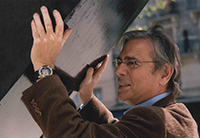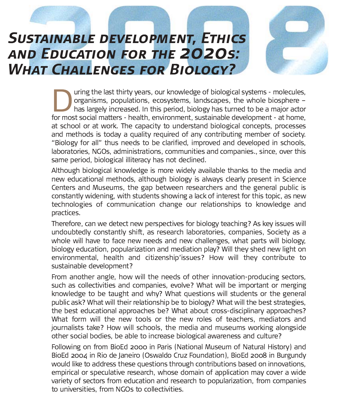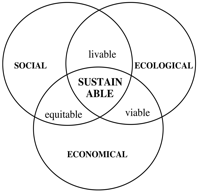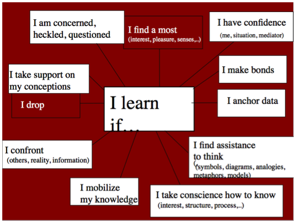
|
The importance of a Sustainable Development Education
André Giordan
Conference presented at the 3ème Weec (World environemental éducation congress) Torino (Italia) 2005
Sustainable development (SD) is a complex concept. But what does it really mean? The sustainable development's definition is given by the Brundtland's Commission in 1987 and adopted at the Rio General conference (1992):
"The durable development satisfies needs of generations present without compromising the possibility for future generations to satisfy their own needs".
In appearance this one can be understand by everybody. In reality, it remains on a philosophical level. It conserves the "good intentions" declaration's style, but doesn't clearly show the relations between the different domains, even between the different social actors that are the bases of all the process.
To palliate this difficulty, sustainable development is often schematized by the way of the intersection of three circles in interaction
Traditional presentation of the sustainable development
But this schema is not sufficient. First we have to realize that sustainable development depends on a choice of values. That means that the ethical dimension is also essential to introduce in this shemata.
Then, it is necessary to become aware that each domain is a system. The systemic approach is necessary to understand them and not only binds us to consider each element inside its specific context but also to consider all the organization of the context through its links with the element.
One of the particularities of sustainable development comes from the fact that these different systems, also complex themselves, must be seen in a perpetual interaction. This notion of system will be not develop here, because there are already a lot of publications about it. On the other hand, it's important to realize that to enter upon this notion, and also sustainable development concept, several factors linked to an analytic approach, typical of the Cartesian thought, have to be rethought. Now the Cartesian thought is the one carried by school. To give an example, the new pedagogies, called "active", promote "the problem's resolving".
But we know that THE solution never exists! Sometime there is no solution. Sometime there is perhaps several solutions, offering some advantages and also some disadvantages. Their consequences are often doubtful, these ones being subdued to the relativity of time and space. More, you can have an amplification of the effects when several different factors are adding. We find this kind of reaction inside the dialogical and recursive principles, typical of the complexity (1). Effects and ground feed back acting together, we can observe an evolution, a history of the elements which are changing through the irreversibility of time.
More, these last ones are creating links with other factors implying interactions, even interdependencies. Theses links will continually modify the entire context. That's why we have to give up with the idea of finding THE solution. What we have to do is to think in term of "fluctuating optimums", if we want to handle with paradoxical, contradictory, woolly or doubtful elements. These optimums try to manage a regulation, to find a balance. They need a perpetual readjustment or refitting depending of the evolution of the process and its environment.
Education for SD in practice
Education for sustainable development as it is usually practiced, too abstract and parceled, does not undertake to tackle the complexity of sustainable development. It does not create the taste or imagination to research alternative management or planning ; it does not encourage the creation of favorable attitudes. Relevant SDE should therefore no longer be limited to disseminate knowledge or confine itself to being a sensory approach. It should capitalize on the successes and failures of the innovations of these last thirty years, otherwise it reinvent "warm water" permanently. It should commit to a type of approach like a "clarification of problem situations" leading directly to action and the will to change.
The sustainable development approach implies to rethink learning:
- to introduce systemic or allosteric type of process,
- to introduce systemic analyse and pragmatics,
- to develop transdisciplinarity approches.
Allosteric Environment to master SD
A pedagogical practice in complementary information
Every branch of instruction includes, into its own curriculum, a series of subjects and objectives dealing with environment.
The students will, while tackling specific problems, acquire the essential knowledge concerning environment.
Talks, inquiries done by (or with) experts will complete this training.
A pedagogical practice in subject matter convergence
Every branch of instruction builds up on conceptual and methodological affinity, or field of interests. A fruitful attempt combines the teaching of sciences (biology, physics, chemistry and technology) on the one hand, geography, economy, history, sociology and political sciences on the other.
Some subject matters supply basic concepts, others supply methodological competence (mathematics, the mother tongue).
An environmental problem may, then, be dealt with by the students and carried through, simultaneously or consecutively, in one or several branches of instruction.
A pedagogical practice of transversal project
Every discipline uses part of its hours to help realize an interdisciplinary project.
The students formulate the problems and develop their knowledge through autonomous investigation (surveys, documents, experiments, simulations).
A team of teachers is responsible for the project, making use of a pedagogical practice focused on the investigating activity of the learners.
Experts may participate, depending on the questions raised by the students. Environment becomes an integrating principle, through a thematic global approach that the students can reinvest in their daily experience. |
Different interdisciplinary approaches
Psychological researches have shown that disaster scenarios, apocalyptic rhetoric have some chance of success if people feel directly involved. But most humans do not feel sufficiently concerned by example about climate change. This concept seems to them too vague, rather abstract and difficult to grasp in their daily lives.
It is a question of making him perceptible and especially accessible through questions which affect them directly. Furthermore, to modify an individual behavior, still the person has to set there; what not does not infer the esoteric discussions between experts or the international Conferences which demobilize because they do not commit straightaway every individual.
In it, is added that it is necessary to be able to act at its level on its environment and locate the consequences of its personal action, including in the world strategy. In parallel, it would be necessary to be able to stand back on its values and the consequences of its choices. Which is conscious that to drink an orange juice or to offer certain present to Christmas, and to begin certain bikes, have not unimportant consequences on the global warming!
If no part of what motivates the environmental behavior of the person, if you do not work at school and the length lifestyles of everyone, such as the company raises surreptitiously, the dream a sustainable society will always be out of reach.
| |
 |
Presentation of Bioed 2008 in Dijon France
1. E. MORIN, (1977) La Méthode 1: La nature de la nature, Seuil, Paris and E. MORIN, (1990) Introduction à la pensée complexe, ESF éd. Paris
|







